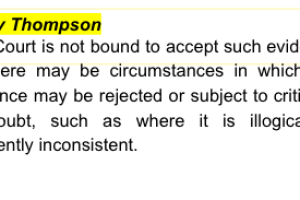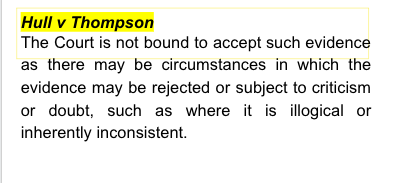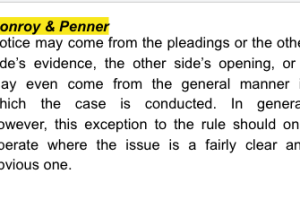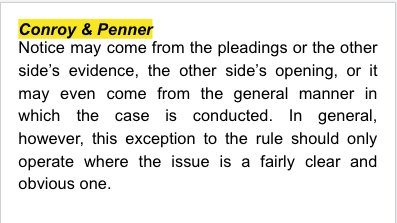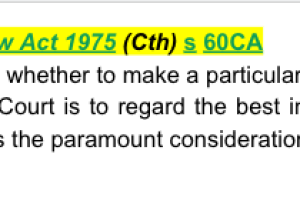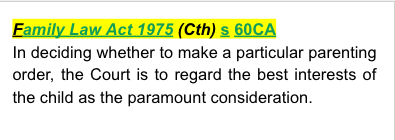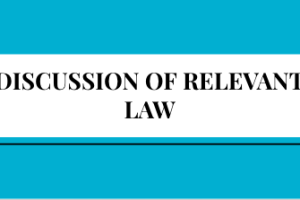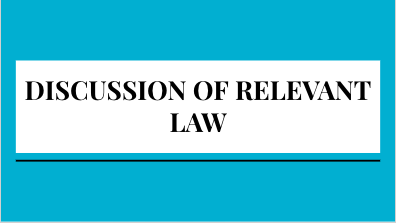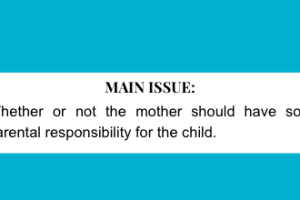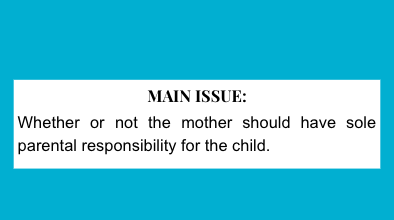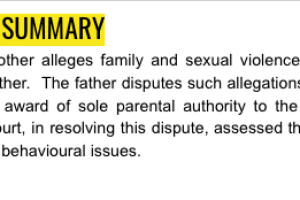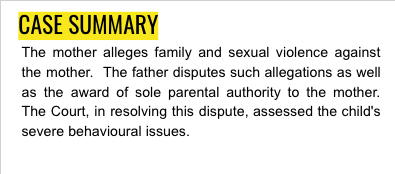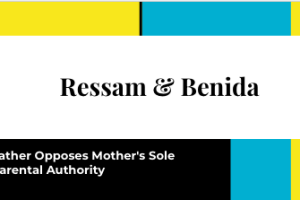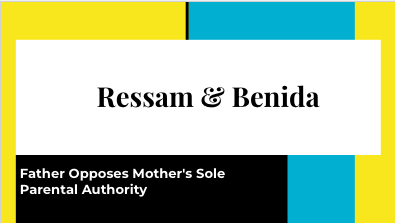- · 4752 friends
Father Opposes Mother's Sole Parental Authority

Ressam & Benida [2022] FedCFamC2F 874 (8 July 2022)

The mother alleges family and sexual violence against the father. The father disputes such allegations as well as the award of sole parental authority to the mother. The Court, in resolving this dispute, assessed the child's severe behavioural issues.

Facts:
The parties met in 2006, and started living together in about mid to late 2006. The parties’ only child, X, was born in 2016. In September 2018, the parties separated. This occurred when the mother left the parties’ home with X. The father initiated parenting proceedings in the then Federal Circuit Court of Australia on 4 October 2018.
Interim parenting orders were made on 29 March 2019 providing that X live with the mother and spend time with the father in a two week cycle as follows: (a) In week 1 from 10am Saturday to 4pm Monday and from 4pm Thursday to 4pm Friday; and (b) In week 2 from 4pm Tuesday to 4pm Wednesday. Orders were made by consent for the parties to attend family therapy and to obtain a behavioural assessment of X. In addition, further interim orders were made for the father to spend time with X as follows: (a) In week 1 from 10am Saturday to 4pm Tuesday; and (b) In week 2 from 4pm Sunday until 4pm Tuesday.
During the adjourned period, the mother filed an application in a case on 24 March 2021 seeking that the father attend an appointment with a clinical psychologist for family therapy and that the mother facilitates the carrying out of a behavioural assessment for X by D Psychology without the involvement of the father, save for that she informs him of the initial appointment.
On 7 June 2021, orders were made by consent, amongst others, that both parties attend an appointment scheduled on 16 June 2021 at D Psychology to commence a behavioural assessment of X and that the father attends family therapy with clinical psychologist Ms E.
The father was then represented by a solicitor who at the commencement of the resumed hearing pressed an application in a case filed on 3 September 2021 to vacate the part-heard final hearing dates on the basis that he had not had sufficient time to prepare for the hearing. The application was refused by the Court, and the transcript of the proceedings on 28, 29 and 30 October 2020 was made available to the father’s solicitor and the other parties.
On 7 October 2021, the mother filed an application in a proceeding seeking that all previous parenting orders be discharged, that she have sole parental responsibility for X, that X live with her, and that X spend no time with the father pending further order. Due to an administrative error that application was not formally given a return date, however, was the subject of discussion at the next listing.
The father’s case in summary is that: (a) The mother was possessive, controlling, and abusive throughout their relationship. (b) The mother applied excessively harsh and psychologically abusive disciplinary practices to X, and she was also neglectful. (c) The mother is not capable of meeting X’s needs.
The mother’s case in summary is that: (a) The father was possessive and controlling throughout their relationship, and has been emotionally, financially, physically and sexually abusive towards her; (b) The father continues to seek to control and undermine her post-separation, particularly her parenting capacity; (c) The father’s approach to parenting and his lack of support for X having a relationship with the mother, including his manipulation of X, has resulted in serious behavioural issues for X; and, (d) The father lacks insight into the future needs of X.

Issue:
Whether or not the mother should have sole parental responsibility for the child.

Applicable law:
Family Law Act 1975 (Cth) ss.60B - outlines the objects and principles underlying Part VII of the Act.
Family Law Act 1975 (Cth) s 60CC - outlines the primary and additional considerations that the Court is to take into account in determining what is in the best interests of the child.
Family Law Act 1975 (Cth) s 60CA - provides that in deciding whether to make a particular parenting order, the Court is to regard the best interests of the child as the paramount consideration.



Analysis:
There has been an ongoing conflict between the parents in respect of decisions which need to be made. The father has time and time again criticised the mother for decisions she has made or which she intends to make, and he has likewise criticised the mother for her lack of consultation with the father in the making of those decisions.
Even where there has been agreement about a particular course, such as for example the course agreed upon in October 2020 for family therapy and a behavioural assessment for X, the father has obfuscated and delayed. It is unlikely that the father will show a level of mature and cooperative involvement in the decision-making required for X’s future or that he will make decisions which best serve X.
The mother has detailed a significant history of abuse by the father towards her, and maintains that she is terrified of the father due to his past actions, and coercive and controlling behaviours. In the context of the coercive and controlling behaviours which have been found to have been engaged in by the father, it is more likely than not, that the allegations by the mother of sexual abuse did occur.
Those behaviours described by the mother are consistent with the father’s other behaviours towards her. The child’s behaviour, including the way X speaks to the mother and the things that he says to the mother, supports a finding that he does so because of the father’s treatment of him and the father’s attitude to the mother.
Conclusion:
All previous parenting orders are discharged. The mother, Ms Benida, has sole parental responsibility for the child, X, born in 2016. The child lives with the mother. The child spends no time with the father, Mr Ressam.
The father is restrained from (a) Approaching the child. (b) Communicating, or attempting to communicate, with the child. (c) Inciting any other person to approach or communicate with the child on his behalf. The mother must, in a timely manner, provide the father with: (a) Updates about significant matters regarding the child’s health and his progress at school; (b) Information about decisions made by her in the exercise of her sole parental responsibility; (c) Copies of any relevant reports about the child. The father is at liberty to send the child a card and/or gift at Christmas and on the child’s birthday each year, but such gifts must be addressed to the mother.


